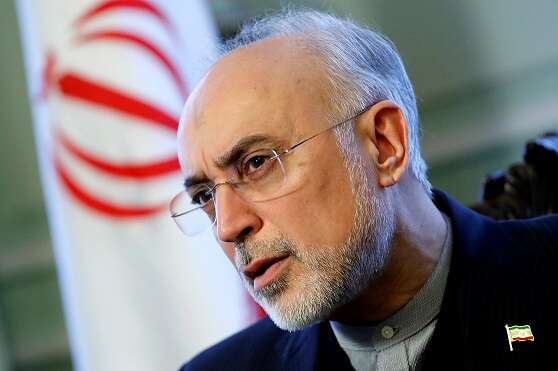by News Agencies and ILH Staff
The latest sanctions on the oil-exporting nation include a new executive order signed by President Donald Trump targeting those who buy or sell Iran conventional arms. US also sanctions Venezuelan President Nicolas Maduro, accusing Iran and Venezuela of having worked "to flout the UN arms embargo" for nearly two years.

Iranian nuclear chief Ali Akbar Salehi | File photo: Reuters/Yves Herman
The United States on Monday slapped
new sanctions on Iran's defense ministry and others involved in its
nuclear and weapons program to support the US assertion that all UN
sanctions against Tehran are now restored, which key European allies as
well as Russia and China reject.
Iran said the new US sanctions, which targeted 27 Iranian entities and people in the nuclear, missile and conventional arms sectors, would have no effect and accused the United States of seeking publicity.
The latest sanctions on the oil-exporting nation include a new executive order signed by President Donald Trump targeting those who buy or sell Iran conventional arms.
US Secretary of State Mike Pompeo told reporters Washington had put new sanctions on Venezuelan President Nicolas Maduro under the order, accusing Iran and Venezuela of having worked "to flout the UN arms embargo" for nearly two years.
Under the same order, the United States also imposed penalties on Iran's Ministry of Defense and Armed Forces Logistics, as well as its Defense Industries Organization and its director, Mehrdad Akhlaghi-Ketabchi.
Others targeted under different programs include senior Atomic Energy Organization of Iran officials as well as people associated with its liquid propellant ballistic missile organization, Shahid Hemmat Industrial Group.
The impetus for the US action is the impending expiry of a UN arms embargo on Iran and an effort to warn foreign actors that they will face US sanctions if they buy or sell arms to Iran. US entities are already barred from such trade.
Under the 2015 nuclear deal that Iran struck with six major powers - Britain, China, France, Germany, Russia and the United States - the UN conventional arms embargo is to set to expire on Oct. 18, shortly before the Nov. 3 US election.
"No matter who you are, if you violate the UN arms embargo on Iran, you risk sanctions," Pompeo told a news conference with Treasury Secretary Steven Mnuchin, Defense Secretary Mark Esper and Robert O'Brien, the national security adviser.
Meanwhile, Ali Akbar Salehi, head of Iran's nuclear agency told delegates at the International Atomic Energy Agency conference in Vienna Monday that the landmark 2015 deal between Tehran and other world powers was worth preserving.
Salehi admitted that the US withdrawal in 2018 - one of President Trump's campaign promises - meant that the deal - the Joint Comprehensive Plan of Action (JCPOA) has been caught in a "quasi-stalemate."
The deal promised Iran economic incentives in exchange for limits on its nuclear program, which was set for a 10-year period. However, not only did the US President Obama administration in the twilight of its existence fly literal planeloads of hard cash to Tehran, but the Iranians have also been caught lying about their enrichment program.
Iran said the new US sanctions, which targeted 27 Iranian entities and people in the nuclear, missile and conventional arms sectors, would have no effect and accused the United States of seeking publicity.
The latest sanctions on the oil-exporting nation include a new executive order signed by President Donald Trump targeting those who buy or sell Iran conventional arms.
US Secretary of State Mike Pompeo told reporters Washington had put new sanctions on Venezuelan President Nicolas Maduro under the order, accusing Iran and Venezuela of having worked "to flout the UN arms embargo" for nearly two years.
Under the same order, the United States also imposed penalties on Iran's Ministry of Defense and Armed Forces Logistics, as well as its Defense Industries Organization and its director, Mehrdad Akhlaghi-Ketabchi.
Others targeted under different programs include senior Atomic Energy Organization of Iran officials as well as people associated with its liquid propellant ballistic missile organization, Shahid Hemmat Industrial Group.
The impetus for the US action is the impending expiry of a UN arms embargo on Iran and an effort to warn foreign actors that they will face US sanctions if they buy or sell arms to Iran. US entities are already barred from such trade.
Under the 2015 nuclear deal that Iran struck with six major powers - Britain, China, France, Germany, Russia and the United States - the UN conventional arms embargo is to set to expire on Oct. 18, shortly before the Nov. 3 US election.
"No matter who you are, if you violate the UN arms embargo on Iran, you risk sanctions," Pompeo told a news conference with Treasury Secretary Steven Mnuchin, Defense Secretary Mark Esper and Robert O'Brien, the national security adviser.
Meanwhile, Ali Akbar Salehi, head of Iran's nuclear agency told delegates at the International Atomic Energy Agency conference in Vienna Monday that the landmark 2015 deal between Tehran and other world powers was worth preserving.
Salehi admitted that the US withdrawal in 2018 - one of President Trump's campaign promises - meant that the deal - the Joint Comprehensive Plan of Action (JCPOA) has been caught in a "quasi-stalemate."
The deal promised Iran economic incentives in exchange for limits on its nuclear program, which was set for a 10-year period. However, not only did the US President Obama administration in the twilight of its existence fly literal planeloads of hard cash to Tehran, but the Iranians have also been caught lying about their enrichment program.
Source: https://www.israelhayom.com/2020/09/22/us-slaps-iran-venezuelan-president-with-new-sanctions/
Follow Middle East and Terrorism on Twitter
No comments:
Post a Comment